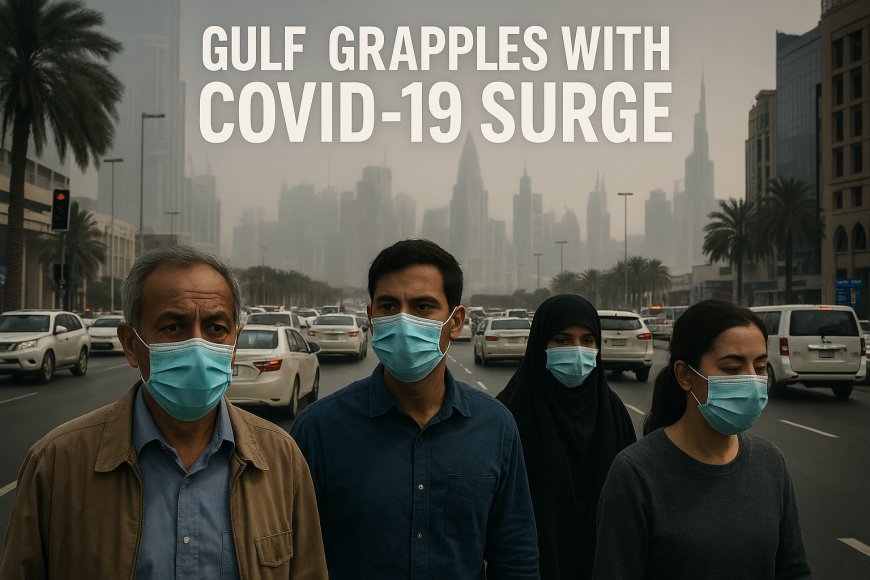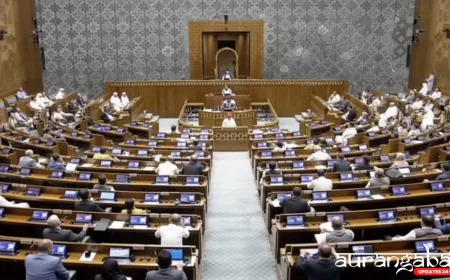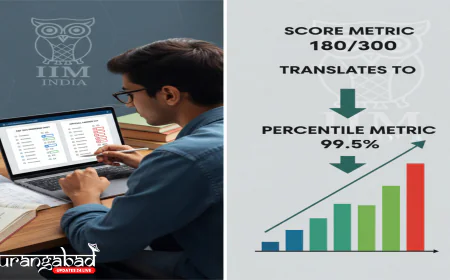Gulf COVID Surge: New Variant, Data Gaps
Gulf countries face a new COVID-19 surge driven by variant NB.1.8.1, low vaccination rates among vulnerable groups, and critical data gaps, raising international health concerns.

Dubai/Riyadh: The Gulf Cooperation Council (GCC) states and the broader Eastern Mediterranean region are currently witnessing a concerning resurgence of COVID-19, reversing a period of relatively low transmission seen earlier in 2025. What began as a subtle uptick in cases has rapidly escalated into a significant wave, fueled by the emergence of a fast-spreading new variant, alarmingly low vaccination rates among vulnerable populations, and critical gaps in transparent public health data. This confluence of factors is raising serious concerns among health experts and international bodies, threatening to strain healthcare systems and undermine hard-won gains in pandemic control. The situation underscores a complex challenge for a region grappling with the delicate balance of maintaining economic openness while safeguarding public health amidst evolving viral threats.
The Resurgence Unveiled: Hotspots and the Shadow of a New Variant
Since mid-February 2025, the epidemiological landscape across the Gulf has shifted dramatically. What was once a manageable trickle of COVID-19 infections, with test positivity rates as low as 4% in March, surged to an alarming 15-17% by late April and mid-May in countries like Saudi Arabia, the UAE, Oman, and Kuwait. This sharp reversal reflects a broader pattern of renewed SARS-CoV-2 activity across multiple regions globally, with the Eastern Mediterranean emerging as a key driver of the current upswing. Beyond the reported cases, which likely represent only a fraction of the actual spread due to reduced testing, health officials are observing similar trends across several nations, indicating a widespread regional challenge.
At the heart of this resurgence lies a new and highly transmissible variant, designated NB.1.8.1 by the World Health Organization (WHO) as a "variant under monitoring" in early 2025. This variant has quickly gained ground, rapidly replacing older strains like LP.8.1 that had been dominant since mid-March. By mid-May, NB.1.8.1 accounted for over 10% of global sequences reported, a significant jump from just 2.5% four weeks prior. The variant's rapid ascent is attributed to a crucial genetic change: it carries a specific mutation (Spike 445) that has been shown to enhance its binding affinity to human cells. This mutation could not only make NB.1.8.1 more infectious, allowing it to spread with greater ease, but also potentially enable it to evade existing immune defenses more effectively, including those conferred by previous infections or vaccinations. While the WHO has yet to confirm whether NB.1.8.1 causes more severe illness, its aggressive transmissibility and potential for immune escape are primary drivers of concern, setting the stage for a period of heightened vigilance across the region.
The Vaccination Puzzle: Lagging Rates and Booster Hesitancy
Despite earlier successes in some Gulf states in achieving high primary vaccination coverage, the current surge casts a harsh light on persistently low vaccination rates, particularly concerning booster uptake and coverage among high-risk groups. This "vaccination gap" is emerging as a critical vulnerability that exacerbates the threat posed by new variants.
Alarming statistics reveal the extent of this challenge: less than 0.5% of older adults in the Gulf region received a COVID-19 shot in 2024. Similarly, uptake among healthcare workers, a frontline group crucial for maintaining robust health services, also remained worryingly low, below 1%. These figures stand in stark contrast to other regions, such as Europe, which reported a 5.1% coverage rate among older adults during the same period. This indicates a significant protective deficit for the most vulnerable members of society, who are at the highest risk of severe illness, hospitalization, and death from COVID-19.
The reasons behind this low uptake are multifaceted. While initial vaccine drives were robust in many GCC countries, a combination of factors may now be contributing to hesitancy or complacency. These could include a widespread perception that the pandemic is "over," a reduced fear of the virus due to milder symptoms from previous variants, or simply a lack of sustained public health campaigns emphasizing the ongoing importance of boosters. Access might also be an issue for certain demographics, such as the large proportion of foreign workers in some Gulf states, who might face unique barriers related to information, language, or healthcare access. Furthermore, waning immunity from earlier vaccine doses, coupled with the emergence of variants capable of some immune evasion, means that even previously vaccinated individuals may no longer possess sufficient protection against the latest strain without a booster. This collective drop in population-level immunity leaves the region susceptible to larger and more impactful waves of infection, placing immense pressure on healthcare resources that have, in many cases, scaled down their COVID-19 response infrastructure.
The Opaque Veil: Data Gaps and Transparency Concerns
One of the most critical and alarming aspects of the current COVID-19 surge in the Gulf is the pervasive issue of data gaps and a lack of transparent reporting. Health authorities in the region are reportedly not providing sufficient detail on key epidemiological indicators, specifically concerning hospitalizations, intensive care unit (ICU) admissions, and COVID-19 related deaths. This opacity creates a significant blind spot, severely hindering both national and international efforts to accurately track the true impact of the virus and formulate effective public health responses.
The implications of such data deficiencies are profound. Without robust and real-time data on severe outcomes, it becomes extraordinarily difficult to assess the true severity of the circulating variants, understand the burden on healthcare systems, or predict future demand for medical resources. Public health officials are essentially operating in the dark, unable to fully grasp the trajectory of the outbreak or identify potential hotspots of severe illness. This lack of granular data also complicates the global effort to monitor variants. Genomic sequencing capacity and the timely reporting of such data are crucial for the international scientific community to track the evolution of the virus, understand new mutations, and assess their potential implications for vaccine effectiveness and disease severity worldwide. When countries fail to report comprehensive data, it creates missing pieces in the global epidemiological puzzle, affecting every nation's ability to prepare and respond.
Furthermore, a lack of transparency can erode public trust. When official numbers do not align with anecdotal evidence of rising illness or when critical data points are withheld, it can foster suspicion and undermine compliance with public health recommendations. Effective pandemic management relies on clear communication and a shared understanding of the risks, both of which are compromised by data gaps. The WHO has consistently advocated for maintaining integrated surveillance systems and strengthening genomic sequencing and reporting, specifically calling out the need for more comprehensive data from the Eastern Mediterranean region, including GCC countries. Without these fundamental pillars of public health surveillance, the Gulf region faces an uphill battle in containing the current surge and preparing for future waves.
Beyond the Numbers: Implications and Challenges for Healthcare
The current COVID-19 surge in the Gulf region extends beyond mere infection numbers; it carries significant implications for healthcare systems, economic stability, and the overall well-being of the population. While precise data on hospitalizations and ICU admissions remain limited, the rapid rise in positivity rates inherently poses a risk of overwhelming healthcare facilities, particularly if the new NB.1.8.1 variant proves to cause more severe illness or if the vulnerable, unvaccinated population continues to grow.
Even if the variant generally causes milder symptoms, a high volume of cases can still strain hospitals through increased emergency room visits, demands for diagnostic testing, and the inevitable requirement for isolation facilities. This can divert resources from other essential healthcare services, potentially leading to delays in elective surgeries, routine check-ups, and the management of chronic conditions. The fatigue among healthcare workers, who have been at the forefront of the pandemic for years, is also a critical concern; another significant wave could lead to burnout and staff shortages.
Beyond the immediate health impact, economic disruptions remain a persistent threat. While Gulf nations have largely focused on maintaining economic openness, prolonged or severe outbreaks could necessitate the re-imposition of targeted public health measures, affecting businesses, travel, and tourism – sectors vital to the region’s diversification efforts. International travel, a significant driver of the Gulf economies, also acts as a double-edged sword, facilitating both economic activity and the rapid spread of new variants. The psychological toll on the population, already fatigued by years of pandemic restrictions and uncertainties, could also deepen, leading to increased anxiety, stress, and mental health challenges. A potential sense of complacency, having navigated previous waves, might also be contributing to reduced adherence to protective measures like masking and social distancing, further enabling the virus's spread in social gatherings and public spaces.
Path Forward: Strategies for Containment and Resilience
Addressing the current COVID-19 surge in the Gulf and building resilience against future waves requires a multi-pronged, coordinated, and transparent approach. The lessons learned globally throughout the pandemic underscore the importance of proactive measures over reactive ones.
Firstly, accelerating vaccination drives is paramount, particularly focusing on vulnerable groups like older adults, immunocompromised individuals, and healthcare workers, who currently exhibit alarmingly low coverage rates. This includes robust campaigns to promote booster uptake and address vaccine hesitancy through clear, evidence-based communication. Countries must ensure equitable access to vaccines for all residents, including the large migrant worker populations.
Secondly, enhancing genomic surveillance and data transparency is critical. Gulf nations must restart or strengthen regular testing, robustly monitor for new variants through comprehensive genomic sequencing, and ensure timely, detailed reporting of cases, hospitalizations, ICU admissions, and deaths. This information is indispensable for accurate risk assessment, informed policy-making, and effective international collaboration. The World Health Organization's recommendations for continuous monitoring and reporting of SARS-CoV-2 activity and its impact on healthcare systems must be fully embraced.
Thirdly, re-evaluating and potentially re-implementing targeted public health measures based on local epidemiological situations should be considered. While broad lockdowns may no longer be feasible or desirable, measures such as mask mandates in crowded indoor spaces, enhanced ventilation, and strategic testing protocols can help curb transmission without severely impacting economic activity.
Finally, fostering stronger regional and international collaboration is essential. Sharing data, best practices, and resources can significantly bolster the Gulf's collective response capacity. The pandemic has repeatedly demonstrated that no country is safe until all countries are safe, making cross-border cooperation indispensable in the ongoing fight against COVID-19. For individuals, personal vigilance remains crucial: considering masking in crowded settings, practicing good hand hygiene, and opting for booster shots when eligible are simple yet powerful steps to protect oneself and the community. By taking decisive and transparent action now, Gulf nations can mitigate the impact of the current surge and build a more resilient future against evolving public health threats.







































